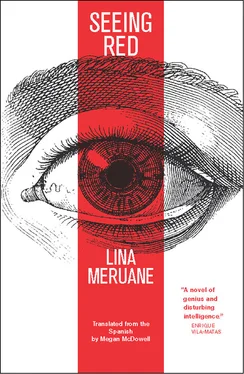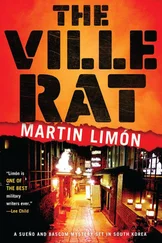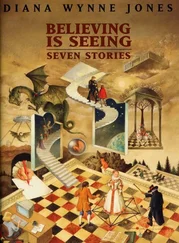Lina Meruane - Seeing Red
Здесь есть возможность читать онлайн «Lina Meruane - Seeing Red» весь текст электронной книги совершенно бесплатно (целиком полную версию без сокращений). В некоторых случаях можно слушать аудио, скачать через торрент в формате fb2 и присутствует краткое содержание. Год выпуска: 2016, Издательство: Deep Vellum Publishing, Жанр: Современная проза, на английском языке. Описание произведения, (предисловие) а так же отзывы посетителей доступны на портале библиотеки ЛибКат.
- Название:Seeing Red
- Автор:
- Издательство:Deep Vellum Publishing
- Жанр:
- Год:2016
- ISBN:нет данных
- Рейтинг книги:3 / 5. Голосов: 1
-
Избранное:Добавить в избранное
- Отзывы:
-
Ваша оценка:
- 60
- 1
- 2
- 3
- 4
- 5
Seeing Red: краткое содержание, описание и аннотация
Предлагаем к чтению аннотацию, описание, краткое содержание или предисловие (зависит от того, что написал сам автор книги «Seeing Red»). Если вы не нашли необходимую информацию о книге — напишите в комментариях, мы постараемся отыскать её.
This powerful, profound autobiographical novel describes a young Chilean writer recently relocated to New York for doctoral work who suffers a stroke, leaving her blind and increasingly dependent on those closest to her. Fiction and autobiography intertwine in an intense, visceral, and caustic novel about the relation between the body, illness, science, and human relationships.
Lina Meruane
Seeing Red — читать онлайн бесплатно полную книгу (весь текст) целиком
Ниже представлен текст книги, разбитый по страницам. Система сохранения места последней прочитанной страницы, позволяет с удобством читать онлайн бесплатно книгу «Seeing Red», без необходимости каждый раз заново искать на чём Вы остановились. Поставьте закладку, и сможете в любой момент перейти на страницу, на которой закончили чтение.
Интервал:
Закладка:
nightly bread
I can’t eat, but who could feel hungry the night before? Dinner, no, but neither is it advisable to go to bed on an empty stomach. How about a slice of bread with butter that then becomes two: anxiety sets my mother’s jaws in motion. I just salivate at the smell of the crumbs slowly charring in the toaster, the melted butter. She drinks tea, loudly stirs in two spoonfuls of sugar, takes a desperate bite of the toast Ignacio makes for her. I see it but I don’t see it, it’s as if I’d seen it: I construct it in my memory. It’s good, says my mother, helping me imagine her every movement. Very good, she says, as if asking a question, and then she confesses she’s eating purely out of vice. I’m not the least bit hungry, she insists, her mouth full. Ignacio makes more toast and my mother swallows it, and soon she asks, like a bulimic bird, is there a little more bread? And of course, there are two bags in the freezer, says my baker boyfriend. My mother burns her tongue on the tea but she doesn’t get a chance to complain, because just then the doorbell rings and startles her. Who could that be, at this hour? Even though the hour is barely seven. Girl! screeches Manuela, who never managed to get past her youth, who still lives in the eighties, still in the student protests, running soaked from the water cannons and roaring with laughter, smoking joints. Optimism personified, absolute unfamiliarity with sadness. Manuela, my mom; mom, Manuela. And Manuela exclaims oh, I love the smell of toasted bread, plugging a kiss on each of my cheeks, squeezing my shoulders, giving me a transfusion of energy. What kind are you eating, marraquetas, amasado ? Did you make it yourself? she asks my mother, who surely looks at her wondering where I’ve found this earthquake. In Chile, I answer her secretly, while Manuela says and I’ve just brought you some paltas as a present. Palta, repeats my mother, and she shrinks. Manuela stands behind me, and leaning over my shoulders she croons again a girl, how crazy, what happened to you! And right in my house, at that party, when we were having such a great time! Yes, I say, but I don’t remember that happiness until she mentions it. I just stopped by to wish you luck, and she sits down next to me. My mother blows on her tea. Stay a while, I tell her, we don’t have any food, but coffee? Bread and avocado? I’m really not bothering you? My mother straightens in her chair, spreads butter on her umpteenth slice of bread, and continues to watch over me silently. OK! great! If I’m not bothering you of course I’ll stay. I move over to the corner, Ignacio puts more bread in the toaster, and my mother chews on her thoughts. Manuela winds herself up and starts to talk about her new paintings and her new job, the one that pays her rent. Manuela couldn’t import the small privileges of a Chilean artist when she came to this country, I explain to my mother. Just like the entitlements from the musty last names that here no one knows. That’s why so many Chileans leave, says Manuela, maybe I’ll end up leaving because of that too. I hear my mother abandon her silence, prompted to ask more about that new job. I take care of a little girl, answers Manuela. She’s the daughter of a family in transition. In transition, I repeat, Ignacio repeats, my mother repeats with growing curiosity. In transition, Manuela also says, since the father discovered he was a woman. Who’s a woman? asks my mother. The father? Exactly, says Manuela, and the father also discovered he is a woman who is only interested, sexually, in other women. That makes him a lesbian. So the girl has two mothers, I clarify, and Manuela laughs, yes indeed, and she adds that he or she is still in love with the girl’s mother, but that she, his wife, who was fairly masculine and maybe wouldn’t have had such a hard time getting behind the transition, decided to abstain. She wasn’t ready to be with a woman, even though she’d spent years with her. Or him. My mother declares that she’s now lost her appetite, but Manuela ignores her. She says: now he has to decide whether he’s going to have the operation. Operation, echoes Ignacio, still making sure the bread doesn’t burn, and mashing, I suppose, another avocado to keep his hands busy with something. Operation, of course, says my mother, in her knowing doctor’s tone, while I hear her shifting in her chair. Manuela decides to give her the surgical details. My mother doesn’t know if she wants to hear them, and I know Ignacio doesn’t. He goes on mashing avocados, or maybe he steals off to the bathroom. I already know the details, and I also know the story’s protagonists. The father’s identity is a subject that used to interest me, but now I abandon the conversation to concentrate on something more concrete and definitive: find a crumb, a single crumb of toasted bread to calm my hunger. Manuela talks tirelessly while I reach out my finger very slowly toward the table, luring the crumbs my mother dropped and figuring the story would keep everyone’s attention elsewhere. My finger crawls along the surface of the table, trapping one crumb after another. I hear Ignacio cough and I know he’s looking at me that he’s intrigued when he asks me, what are you looking for? Looking for? I snatch my hand away, retreat into my secret hunger and listen enviously to Manuela talking with her mouth full of words and bread with avocado. My mother groans, utterly full on the other side of the table, and she takes advantage of the lull to ask a question that’s more like an impatient order, what time is it? Isn’t it time for bed? But it’s still early. Please, no one move. This is my farewell party. Manuela, says my mother very seriously and very alone but shielding herself behind the plural: we’re going to have to ask you to go. Lucina needs her rest.
a cry
My mother asks for some covers for her bed. What about the sheet? But an un-ironed sheet wasn’t enough, she asked for the heavy weight of a blanket over her small and gaunt frame. Mom, it’s 30 degrees out, you’ll fry. Not at all, replied my mother: she would sleep with the air conditioner on for that whole summer night. Mom, I charged again, profaning our familial hierarchy again, how could you? Have you gone crazy? The electricity bill will cost an arm and a leg. Or an eye. Oh, I know, and you’ve just lost your little student stipend, I know, you don’t have to rub it in my face, said my mother without even a full stop in the middle, without breathing; the victim’s guile spilling from her mouth as my ever-smaller mother dragged out her words and begged for her candy: if you don’t give it to me, I won’t sleep. I shrugged. Ignacio shrugged. My mother shrank like a silkworm between the sheets and under our thick winter blanket. The living room went dark with her in it, hibernating. We went to bed too, but Ignacio tossed and turned and every insomniac somersault kept me from falling asleep. Talk to me about something, if you can’t sleep. Ignacio hugged me and started to spew everything that was hammering at his brain, twisted nails, little needles, almost insignificant, the stingers of African wasps that repeated to him the following: would the alarm go off at five in the morning? Should we have ordered a taxi to come pick us up? Would my insurance pay my bills? Would there still be bread in the refrigerator for my mother’s breakfast? But no, I said, discreetly moving my hand over his face, don’t worry about her, she’s easy to please if you follow her lead. Yeah? he started to ask, already dozing. Yes, she’s so scared, I said, and of course worried, he said. Yes, yes, I repeated, yawning, as if it wasn’t me she was worried about, as if the imminent operation wasn’t happening to us. Because we suffered that night without knowing it. And, holding tight to trivialities, thinking about my mother’s anxiety and her easy happiness, we sank gradually into the mattress, but soon the springs pushed us up again toward consciousness. We heard a cry. A high-pitched cry. A scream of terror. A scream that lay like a cable through the night. And it came from the living room, from the mouth, the larynx, from the strident vocal chords of my mother. Did you hear that? I asked Ignacio. Yes, I heard it, it just woke me up. It’s my mother, I said. Yes, it’s your mother, he answered, with zero desire to get up. She’s my mother, I’ll take care of it. I went sliding along the hallway, terrified of finding a rapist, a thief, a hairy spider, or a snake tangled up in my mother’s legs. I held on to the walls, afraid I would bump into her. Mama, I whispered, taking a step toward my childhood, suddenly lost in a hallway before the Santiago bedroom where my mother was sleeping. Are you there? Are you awake, mom? I returned suddenly to New York with my bare feet at the edge of her mattress. I waited for an instant, remembering how I’d asked her the same question hundreds of times, separating her eyelids with minuscule fingers in search of awake eyes in her sleeping body. Mom. I said it again and filled my mouth with that word that smelled of milk under her perfume. But it was that same mother who had just torn through the night with her cry, who had howled and woken us up but hadn’t woken up herself, who was now snoring gently, clutching the blanket. Mom! She didn’t answer. The inflatable mattress hissed under her dead weight, under the imperceptible rocking that pushed out the air supporting her. The mattress was in motion, alert but unconscious or dreaming; just like my mother, I thought.
Читать дальшеИнтервал:
Закладка:
Похожие книги на «Seeing Red»
Представляем Вашему вниманию похожие книги на «Seeing Red» списком для выбора. Мы отобрали схожую по названию и смыслу литературу в надежде предоставить читателям больше вариантов отыскать новые, интересные, ещё непрочитанные произведения.
Обсуждение, отзывы о книге «Seeing Red» и просто собственные мнения читателей. Оставьте ваши комментарии, напишите, что Вы думаете о произведении, его смысле или главных героях. Укажите что конкретно понравилось, а что нет, и почему Вы так считаете.












